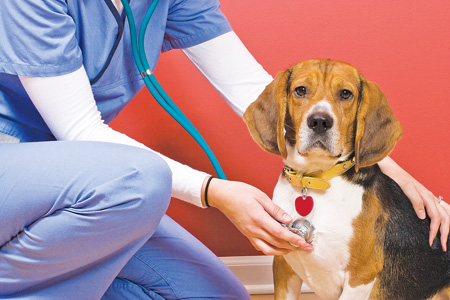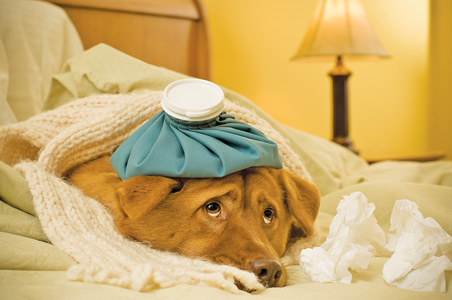Laika, a happy Labrador, loves everyone – except the vet. The family dreads the day she has to be taken to the clinic for a routine check-up. Laika dog recognises the clinic from the end of the street and starts panicking. Her case is not uncommon. For most pets, visiting the vet is fraught with anxiety. A variety of circumstances can bring on the stress – a dog could associate the visit with an unpleasant procedure like nail clipping, or a frightening experience at the clinic. Whatever the cause, an anxious animal is not just difficult to contain, but can also lead to the vet misdiagnosing the animal – the dog’s abdominal muscles contract, making palpation difficult; the pupils dilate, making an ophthalmic examination difficult; the heart rate increases and the stress often causes changes in blood parameters too. If taking your dog to the vet’s is a stressful time for you and your dog, use our tips below to make that dreaded visit safer and more pleasant for you, your pet and your veterinarian.
• Start On The Right Paw:
Most people don’t take their young pup to visit the vet, unless it is for inoculations or if it is ill. By then the pup associates vet visits as an unpleasant experience. Instead, take your young pup to the vet for a ‘wellness visit’, where the vet handles the dog, plays with it, gives it a treat and sends it home. Several such visits in the first few months can go a long way in ensuring that your pup views the clinic as a fun place to go to. Most vets are extremely busy so do consult with your vet and schedule your visit at a convenient time.
Pups that aren’t handled at a young age are difficult to control on the examination table. So get your pup accustomed to having its ears cleaned, teeth brushed and groomed daily, it will better accept a vet’s handling in an emergency.
• Handle With Care:
It takes skill to restrain and treat a dog. In many clinics, a dog is grabbed, muzzled (whether or not it is a biter) and literally thrown on the examining table, resulting in a stressed out dog. So make sure your vet takes time to understand your dog and handle it accordingly. For many a dog, being raised on to a cold, slippery, metal table can be a traumatising experience in itself. These dogs benefit from being treated on the floor or you can place a towel or non-slip mat on the examining table. Keep in mind that a good vet will always try and make the patient feel at ease before starting to examine.

• Calm Down:
Pets are highly tuned in to their owners’ emotions, and a nervous owner often will translate to a nervous pet. So stay calm as it can help even a highly-strung animal to relax. Talking gently, cajoling or coaxing the dog with soft treats can make a big difference in changing the experience for your dog.
Sometimes, a dog can act up if the owner is around. Protective dogs, especially, can become stressed when their owners are close by. In such cases, it is normal for the vet to ask the owner to step back and let a trained helper handle the animal. Don’t be offended by the suggestion. Everyone benefits from it and you may realise that your dog is calmer when someone other than you restrains it. In case the owner himself is nervous by nature or is extremely anxious about his pet, it would be better to let a calmer friend or relative accompany the pet to the clinic.
• Don’t Make The Wait Too Long:
If your dog is the kind to pick up on another’s stress or dislikes meeting other dogs, wait outside the clinic till your turn comes. If your dog is aggressive or reactive to other dogs, ask your vet to schedule the visit as the first consult, before other dogs arrive, or as the last consult after all the patients for the day are done.
• If All Fails:
In certain cases where the dog has taken a particular dislike to a certain vet or has a gender preference, switching to another vet can make it easier on all concerned. Sometimes, in spite of everything, there will be some dogs that detest going to the clinic and get unmanageable or even aggressive on the examination table. In that case, vets will muzzle the dog; in certain extreme cases, the vet may also need to sedate an unruly dog in order to be able to treat it.
When a dog is conditioned to enjoy clinic visits, the medical care your dog receives can be the very best. It is up to you, the owner to ensure that your dog copes well at the vet’s – it could save his life one day.
- The Dark Side Of Pampered Pets: Is Your Kindness Harming Your Dog? - 16 March2024
- Kids And Preventing Dog Bites - 18 March2023
- Ordinary Dogs With Extraordinary Jobs - 13 August2022
